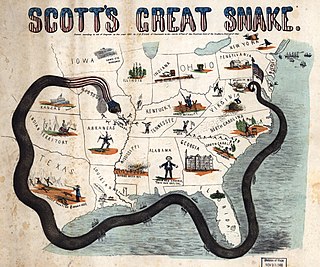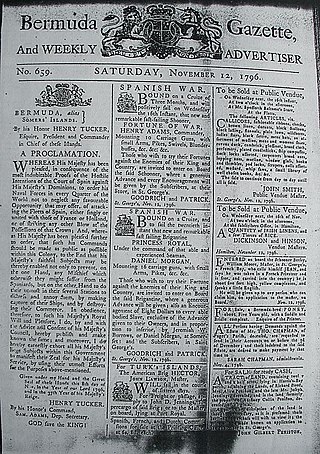Related Research Articles

A letter of marque and reprisal was a government license in the Age of Sail that authorized a private person, known as a privateer or corsair, to attack and capture vessels of a nation at war with the issuer. After capturing, the privateers could bring the case of that prize before their own admiralty court for condemnation and transfer of ownership to the privateer. A letter of marque and reprisal would include permission to cross an international border to conduct a reprisal and was authorized by an issuing jurisdiction to conduct reprisal operations outside its borders.

The law of war is the component of international law that regulates the conditions for initiating war and the conduct of hostilities. Laws of war define sovereignty and nationhood, states and territories, occupation, and other critical terms of law.

A blockade is the act of actively preventing a country or region from receiving or sending out food, supplies, weapons, or communications, and sometimes people, by military force. A blockade differs from an embargo or sanction, which are legal barriers to trade rather than physical barriers. It is also distinct from a siege in that a blockade is usually directed at an entire country or region, rather than a fortress or city and the objective may not always be to conquer the area.

The Hague Conventions of 1899 and 1907 are a series of international treaties and declarations negotiated at two international peace conferences at The Hague in the Netherlands. Along with the Geneva Conventions, the Hague Conventions were among the first formal statements of the laws of war and war crimes in the body of secular international law. A third conference was planned for 1914 and later rescheduled for 1915, but it did not take place because of the start of World War I.
The London Naval Conference (1908–09) was a continuation of the debates of the 2nd Hague Conference, with the United Kingdom hoping for the formation of an International Prize Court. Ten nations sent representatives, the main naval powers of Europe and the United States and Japan. The conference met from December 4, 1908 to February 26, 1909. The agreements were issued as the Declaration of London, containing seventy-one articles it restated much existing international maritime law.

Unrestricted submarine warfare is a type of naval warfare in which submarines sink merchant ships such as freighters and tankers without warning. The use of unrestricted submarine warfare has had significant impacts on international relations in regards to both the First World War and the Second World War. Its history has been dominated by German decision making.

The Paris Declaration respecting Maritime Law of 16 April 1856 was an international multilateral treaty agreed to by the warring parties in the Crimean War gathered at the Congress at Paris after the peace treaty of Paris had been signed in March 1856. As an important juridical novelty in international law the treaty for the first time created the possibility for nations that were not involved in the establishment of the agreement and did not sign, to become a party by acceding the declaration afterwards. So did altogether 55 nations, which otherwise would have been impossible in such a short period. This represented a large step in the globalisation of international law.

Commerce raiding is a form of naval warfare used to destroy or disrupt logistics of the enemy on the open sea by attacking its merchant shipping, rather than engaging its combatants or enforcing a blockade against them.
Prize money refers in particular to naval prize money, usually arising in naval warfare, but also in other circumstances. It was a monetary reward paid in accordance with the prize law of a belligerent state to the crew of a ship belonging to the state, either a warship of its navy or a privateer vessel commissioned by the state. Prize money was most frequently awarded for the capture of enemy ships or of cargoes belonging to an enemy in time of war, either arrested in port at the outbreak of war or captured during the war in international waters or other waters not the territorial waters of a neutral state. Goods carried in neutral ships that are classed as contraband, being shipped to enemy-controlled territory and liable to be useful to it for making war, were also liable to be taken as prizes, but non-contraband goods belonging to neutrals were not. Claims for the award of prize money were usually heard in a prize court, which had to adjudicate the claim and condemn the prize before any distribution of cash or goods could be made to the captors.

Sir Julian Stafford Corbett was a prominent British naval historian and geostrategist of the late 19th and early 20th centuries, whose works helped shape the Royal Navy's reforms of that era. One of his most famous works is Some Principles of Maritime Strategy, which remains a classic among students of naval warfare. Corbett was a good friend and ally of naval reformer Admiral John "Jacky" Fisher, the First Sea Lord. He was chosen to write the official history of British Naval operations during World War I.

Command of the sea is a naval military concept regarding the strength of a particular navy to a specific naval area it controls. A navy has command of the sea when it is so strong that its rivals cannot attack it directly. This dominance may apply to its surrounding waters or may extend far into the oceans, meaning the country has a blue-water navy. It is the naval equivalent of air supremacy.
Visit and Search is the right of a belligerent warship, under certain conditions, to board a neutral merchant ship in order to verify its true character. The term probably refers to a misunderstanding of the French word visite, which in this context simply means search.

The Congress of Paris is the name for a series of diplomatic meetings held in 1856 in Paris, France, to negotiate peace between the warring powers in the Crimean War that had started almost three years earlier.
Naval strategy is the planning and conduct of war at sea, the naval equivalent of military strategy on land.

In admiralty law prizes are equipment, vehicles, vessels, and cargo captured during armed conflict. The most common use of prize in this sense is the capture of an enemy ship and its cargo as a prize of war. In the past, the capturing force would commonly be allotted a share of the worth of the captured prize. Nations often granted letters of marque that would entitle private parties to capture enemy property, usually ships. Once the ship was secured on friendly territory, it would be made the subject of a prize case: an in rem proceeding in which the court determined the status of the condemned property and the manner in which the property was to be disposed of.
Air warfare must comply with laws and customs of war, including international humanitarian law by protecting the victims of the conflict and refraining from attacks on protected persons.
The Confederate privateers were privately owned ships that were authorized by the government of the Confederate States of America to attack the shipping of the United States. Although the appeal was to profit by capturing merchant vessels and seizing their cargoes, the government was most interested in diverting the efforts of the Union Navy away from the blockade of Southern ports, and perhaps to encourage European intervention in the conflict.

The Geneva Conventions are international humanitarian laws consisting of four treaties and three additional protocols that establish international legal standards for humanitarian treatment in war. The singular term Geneva Convention colloquially denotes the agreements of 1949, negotiated in the aftermath of the Second World War (1939–1945), which updated the terms of the two 1929 treaties and added two new conventions. The Geneva Conventions extensively define the basic rights of wartime prisoners, civilians and military personnel; establish protections for the wounded and sick; and provide protections for the civilians in and around a war-zone.
Cruiser rules, alternatively called prize rules is a colloquial phrase referring to the conventions regarding the attacking of a merchant ship by an armed vessel. Here cruiser is meant in its original meaning of a ship sent on an independent mission such as commerce raiding. A cruiser in modern naval terminology refers to a type of ship rather than its mission. Cruiser rules govern when it is permissible to open fire on an unarmed ship and the treatment of the crews of captured vessels, and are contrasted to unrestricted submarine warfare where submarines attack without warning and do not act to protect crew.
References
- John Westlake, International Law: War (London, 1910)
- American Journal of International Law (supplement, New York, 1909)
- Andrew Lambert (ed.) 21st Century Corbett: Maritime Strategy and Naval Policy for the Modern Era. (Annapolis, 2017) Ch. 3.